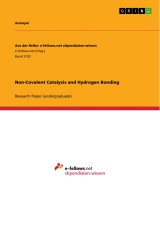Details

Non-Covalent Catalysis and Hydrogen Bonding
1. Auflage
|
15,99 € |
|
| Verlag: | Grin Verlag |
| Format: | |
| Veröffentl.: | 08.08.2019 |
| ISBN/EAN: | 9783668995703 |
| Sprache: | englisch |
| Anzahl Seiten: | 34 |
Dieses eBook erhalten Sie ohne Kopierschutz.
Beschreibungen
Research Paper (undergraduate) from the year 2019 in the subject Chemistry - Bio-chemistry, grade: 1,0, University of Cologne, language: English, abstract: This work is about the non-covalent catalysis and concentrates on the hydrogen-bond catalysis.
Nowadays it is common to use catalysis in organic synthesis. It can help in orienting the substrates, lowering barriers to reaction and accelerating the rates of reaction.
In addition to metal-ligand systems and biocatalysts, there is another class of catalysts, the organocatalysts which are free of any metals, like many enzymes. The organocatalysts often consist of chiral compounds. The output materials are easy to find in the nature.
How these catalysts accelerate the reaction rates is a central question in organic synthesis. It is important to distinguish the interactions with the organic substrates between covalent and non-covalent bonds. The activation of a carbonyl compound by conversion into an enamine or into an iminium ion belongs to the covalent catalysis, while to increase the electrophilicity of a carbonyl group by formation of hydrogen bondings is a typical example for non-covalent organocatalysis.
Thus, the acceleration and the control of the reaction rates depend on formation of hydrogen bonds for non-covalent organocatalysis. It is possible to catalyse two hydrogen bonds which occur in dual hydrogen bonding donors.
Nowadays it is common to use catalysis in organic synthesis. It can help in orienting the substrates, lowering barriers to reaction and accelerating the rates of reaction.
In addition to metal-ligand systems and biocatalysts, there is another class of catalysts, the organocatalysts which are free of any metals, like many enzymes. The organocatalysts often consist of chiral compounds. The output materials are easy to find in the nature.
How these catalysts accelerate the reaction rates is a central question in organic synthesis. It is important to distinguish the interactions with the organic substrates between covalent and non-covalent bonds. The activation of a carbonyl compound by conversion into an enamine or into an iminium ion belongs to the covalent catalysis, while to increase the electrophilicity of a carbonyl group by formation of hydrogen bondings is a typical example for non-covalent organocatalysis.
Thus, the acceleration and the control of the reaction rates depend on formation of hydrogen bonds for non-covalent organocatalysis. It is possible to catalyse two hydrogen bonds which occur in dual hydrogen bonding donors.

















